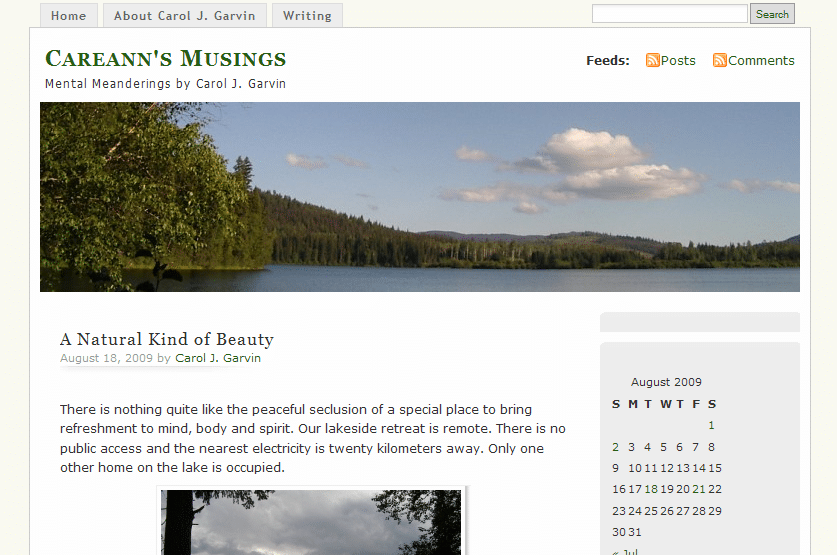Another website review for you today! Carol/Careann of Careann.wordpress.com is another one of those bloggers I feel like I’ve seen just everywhere. We’ll look at how she can find and apply a niche to help grow her blog.

Kathleen’s comments
Hello Careann!
Yours is another blog that I’m honestly not sure what to talk about! Your title and picture accurately represent the content, and it’s laid out in an easy-to-follow and eye-pleasing way!
I’m going to ask you the same question I’ve asked a few others. What is the goal of your blog? If it’s self-expression and telling people who you are, then I really don’t see anything to change! I don’t think it’s to promote the articles you’ve written, as they’re already published in magazines, and you won’t get paid more if they go find an old issue. (Or will you?)
Are you wanting to interest people in your unpublished novels? I don’t think so, since you don’t mention them that often . . . which is fine. Some of us like to do that, while others wait to be published. Neither approach is wrong. Once you DO have novels to promote, you’ll want to change the whole focus of your blog and site . . . but that’s not right now.
The final possibility is that you’re like last Friday’s blogger . . . you’re just looking for community online, and your blog is a part of that. If that’s the case, then I’ll copy something I shared with her in the comments.
In order for something to succeed in today’s world—where the whole world is essentially connected and available to everyone—it has to fit a niche . . . a smaller target or focus. We all can’t “afford” to be interested in everything and involved in everything on the entire Internet, so we “weed out” what is slightly less important. We look for that thing that interests us 101%.
Your website/blog will be more likely to succeed if you find SOMETHING to center it around . . . something a little more specific than just “writing.” If you don’t want to center it around a genre, then you can center it around your location and try to find writers near you, or who are interested in your location. [This might be what you want to do, Careann. All you’d have to do is highlight your location.] Or you could target writers in your age group. Or you could center it around writers-who-live-in-the-country. You could even pick
something quirky, like writers who love yellow or writers who love to go barefoot. Of course you’d welcome writers (and readers) who love pink a little more than yellow, or writers who really don’t go barefoot all that often . . . but just the fact that it’s got this “grabby” idea will make your visitors more interested, and also make your blog stick in their minds a little more.
Have some fun with ideas!
—Kathleen MacIver, KatieDid Design
Jordan’s comments
Whoa! My next WIP was going to be set in the Fraser Valley Regional District (in a fictional city between Abbotsford and Chilliwack—I was going to call it Lackaway, but I wasn’t sure if that’d sound too rhymey to be believable as a neighbor to Chilliwack. Um . . . anyway. . . .). Awesome—if I ever go back to it, I’ll know who to call!
Pages
Your about page is good&madsh;personable, friendly and informative. It has links to connect with you and your email address. But if I didn’t already know it was there, I might not think to look on the About page before giving up (and, of course, I might). This is why it’s also good to have a dedicated contact page—it doesn’t have to be long or even say anything interesting. You can use a form or list your email address (but do keep it on the about page, too).
I like that your writing page has your writing credits with links to the articles where possible. That’s great! But, like Kathleen said, I’d like to see more about your fiction WIPs (if you’re comfortable with that). It doesn’t have to be an excerpt; even a pitch paragraph or log line description would be good.
I also like that you highlight your Flickr stream on your blog. You link to your Facebook profile on your About page as well; you could add a badge to your sidebar if you’re comfortable with that.
Search engine presence
You’ve got some competition for your name (without your middle initial)—apparently another Carol Garvin is a painter. Yahoo has your blog at #4 for [Carol Garvin], and Google has your about page as #10. Bing . . . well, let’s just move on.
With your middle initial, your blog is #1 on Yahoo and Google (well, #1 and #2 on Google), and #2 and #3 on Bing. Your IMDb page (that’s right, folks, she’s in the Internet Movie Database) outranks your site on Bing.
For [Careann], Yahoo has your blog at #1 and #2, Google has your Flickr stream at #1 and your blog at #2 and I’m about ready to slap Bing in the face.
As always, the standard advice to improve your rankings is to get more links. In addition to the usual sources (guest posts, etc.), you might ask the magazines with your articles online to include a link back to your blog, either in the byline or if they have a short author bio, using your name as the link anchor text.
 Finally, I just want to reiterate what Kathleen said about using a niche approach to blogging. Working to appeal to a specific, if narrow, audience can help to grow your blog more than trying to appeal to everyone. This is just like fiction—we don’t expect that everyone will love everything we write (well, okay, we do, but we don’t reasonably expect that 😉 ). We know that we have to write to our audience—our niche, our genre.
Finally, I just want to reiterate what Kathleen said about using a niche approach to blogging. Working to appeal to a specific, if narrow, audience can help to grow your blog more than trying to appeal to everyone. This is just like fiction—we don’t expect that everyone will love everything we write (well, okay, we do, but we don’t reasonably expect that 😉 ). We know that we have to write to our audience—our niche, our genre.
Also, check out some recent posts on my other blog for help on finding your blog niche and expressing your blog niche.
What do you think? Have you focused on a specific audience with your blog? How did you find your niche?
Photo credits: yellow paint—Tom; puzzle piece (get it—a niche?)— Andronicus Riyono
 After your book has been accepted for publication, your website is an even more powerful tool. If you’re still solely on a blog on a free domain (i.e., ilurvewritin.blogspot.com), it’s time to buy your own domain, preferably YOURNAME.com. And along with a new domain, this is a good time to upgrade to a “real” website—keeping your blog, of course, but also hosting a stable website. Ideally, the blog and the website design will be integrated seamlessly.
After your book has been accepted for publication, your website is an even more powerful tool. If you’re still solely on a blog on a free domain (i.e., ilurvewritin.blogspot.com), it’s time to buy your own domain, preferably YOURNAME.com. And along with a new domain, this is a good time to upgrade to a “real” website—keeping your blog, of course, but also hosting a stable website. Ideally, the blog and the website design will be integrated seamlessly. How can I do this? Well, along with the above ideas, it’s also a good idea to spread the word on other websites through advertisements, reviews, releases, contests, and other publicity.
How can I do this? Well, along with the above ideas, it’s also a good idea to spread the word on other websites through advertisements, reviews, releases, contests, and other publicity. A community based around a blog, forum or website means that people feel welcome. People can participate and interact with you. People come back.
A community based around a blog, forum or website means that people feel welcome. People can participate and interact with you. People come back.  While you’re preparing for publication, it’s also a good time to get your web presence ready—especially to find the niche where you’ll fit in the blogging and publishing (and publogging?) worlds.
While you’re preparing for publication, it’s also a good time to get your web presence ready—especially to find the niche where you’ll fit in the blogging and publishing (and publogging?) worlds.  How can I do this? Professional appearance—which we’ll get to hear a lot about in our website critique series this month, with professional website designer Kathleen MacIver of
How can I do this? Professional appearance—which we’ll get to hear a lot about in our website critique series this month, with professional website designer Kathleen MacIver of  However, do not use your website as the only medium an agent can see your query or sample pages, especially not if they ask for any writing from you. An agent or editor will expect you to email them words (either in the body of the email or as an attachment)—not a link to their website. Never make an agent do more work for your writing when they’re interested. Odds are good that they won’t follow links.
However, do not use your website as the only medium an agent can see your query or sample pages, especially not if they ask for any writing from you. An agent or editor will expect you to email them words (either in the body of the email or as an attachment)—not a link to their website. Never make an agent do more work for your writing when they’re interested. Odds are good that they won’t follow links.